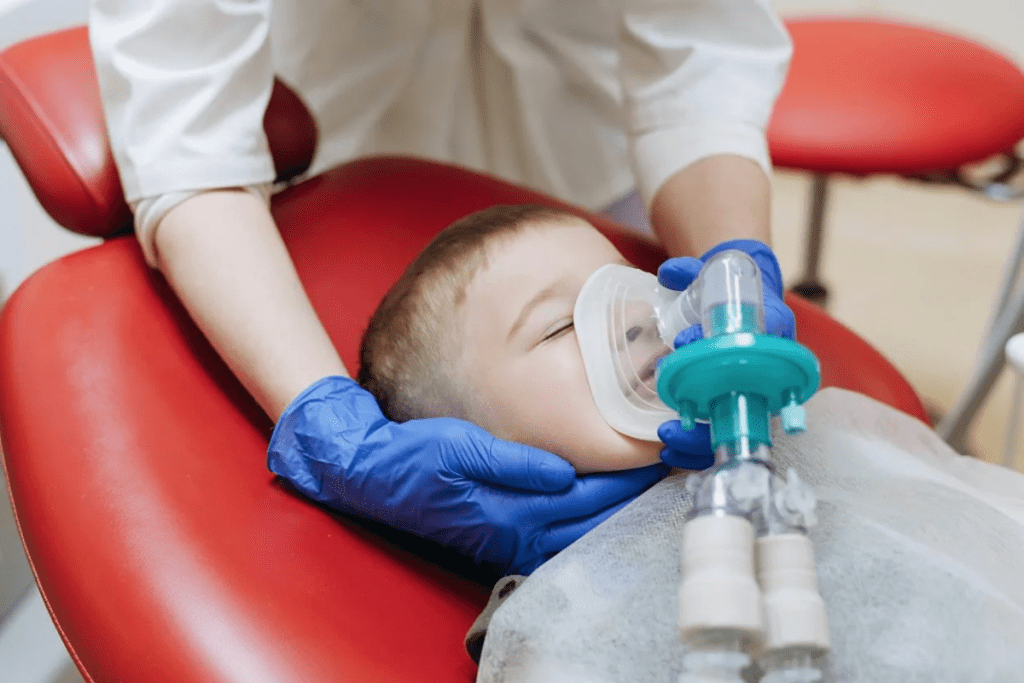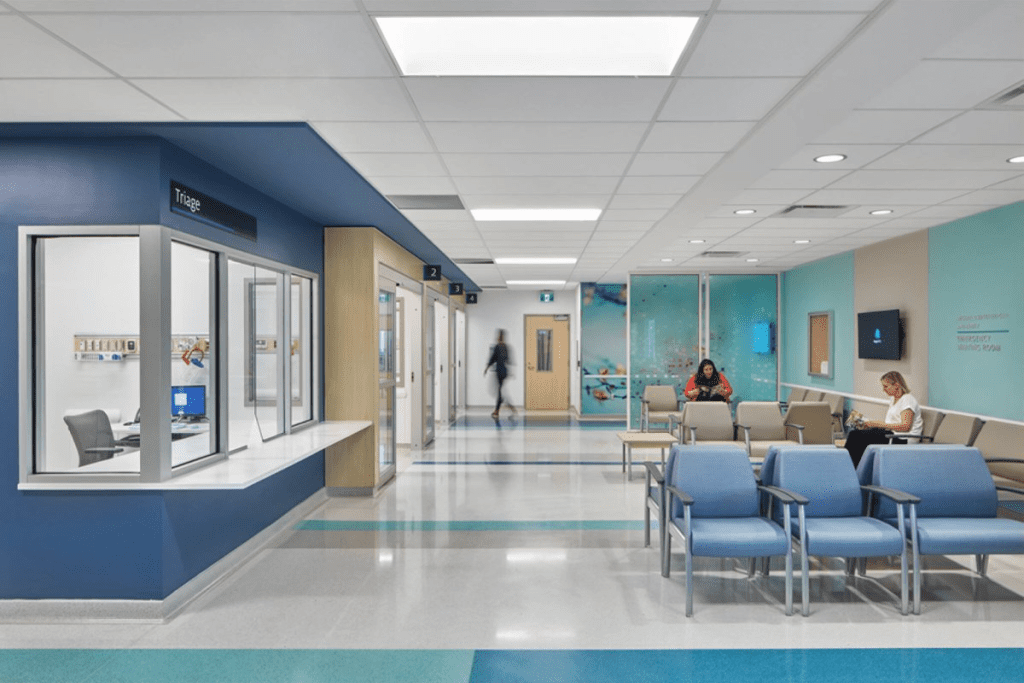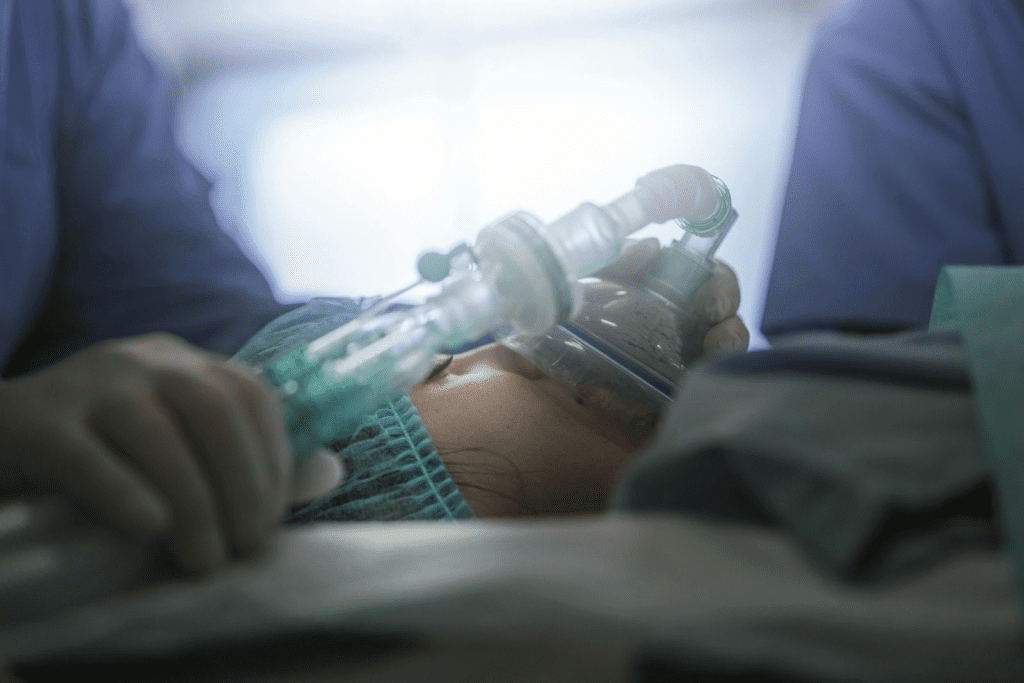Last Updated on November 14, 2025 by
As a parent, waiting for your child to wake up from anesthesia can be very worrying. The time it takes to wake up depends on their age, the type of anesthesia used, and their health.

At Liv Hospital, we know how important it is to care for our international patients. We make sure our young patients are well taken care of. We also help parents know what to expect when their child is recovering.
The time it takes for a child to wake up from anesthesia can vary. This makes every child’s recovery different.
When a child has surgery, general anesthesia is key. It keeps them pain-free and still. At our place, we know parents worry about anesthesia’s effects on their kids.
General anesthesia makes a child deeply relaxed and pain-free during surgery. Our skilled team watches over the child’s vital signs to keep them safe. We pick the right anesthesia based on the child’s age, weight, and health history to lower risks.
Pediatric anesthesia is different from adult anesthesia. Children’s bodies are still growing, with different metabolic rates and heart rates. We adjust our anesthesia to fit these needs, aiming for the best results for kids.
At Liv Hospital, we follow strict safety rules for kids under anesthesia. This includes watching vital signs closely and choosing the right anesthesia. Our team works hard to make sure kids are safe and comfortable during surgery. We use the latest safety measures, so parents can relax.
Parents often wonder how long it takes for their child to recover from anesthesia. We understand this is a big concern. We’re here to guide you through the recovery process.
The timeline for recovery from anesthesia in children can vary. But there are general guidelines that apply to most cases.

Children usually start to wake up about 6.4 to 7.6 minutes after the anesthesia stops. This is a critical time. Our medical team closely watches your child’s vital signs to ensure a smooth transition.
The breathing tube, used to help your child breathe during surgery, is removed within 8 to 9 minutes after the anesthesia stops. Our experienced healthcare professionals manage this process carefully.
Complete clinical recovery, when your child is ready to leave the post-anesthesia care unit (PACU), usually takes 21 to 23 minutes. We watch for any anesthesia side effects and make sure your child is comfortable and stable before discharge.
Remember, while these times are averages, the actual recovery time can vary. It depends on the surgery type, your child’s health, and the anesthesia used. Our team is dedicated to providing personalized care to your child throughout the recovery process.
Several key factors influence how quickly children wake up from anesthesia. Our medical team carefully considers these factors to ensure the best outcome for your child.
A child’s age and developmental stage are crucial in their recovery from anesthesia. Younger children tend to recover more quickly than older children. But this can vary based on individual developmental factors. “The age of the child is an important factor in determining the rate of recovery from anesthesia,” pediatric anesthesiologists note.
The type and duration of general anesthesia used can significantly impact recovery time. Modern anesthetics are short-acting, allowing for quicker recovery. However, the duration of the anesthesia can affect how long it stays in the child’s system.
The complexity and length of the surgical procedure also influence recovery time. More complex surgeries may require longer anesthesia, leading to longer wake-up times. Our surgical team works efficiently to minimize anesthesia duration while ensuring the procedure’s success.
Children with pre-existing health conditions may have different recovery profiles. We carefully assess each child’s health status before administering anesthesia. This allows us to tailor our approach to their specific needs.
By understanding and managing these factors, we can optimize the anesthesia experience for your child. This ensures a smooth and safe recovery. The interplay of age, anesthesia type, surgical complexity, and health status all contribute to how quickly a child wakes up from full anesthesia.
Children go through different stages when they wake up from general anesthesia. We watch them closely to keep them safe and comfortable.
The first stage is when children start to wake up. We watch them closely for any changes.
In the second stage, children start to move and show reflexes. This means they are getting better.

By the third stage, children start to know what’s going on around them. They may even talk to their parents.
The last stage is when children are fully awake and can talk. We make sure they are okay before moving them to the recovery room.
We work hard to make sure children have a smooth recovery. We want to help families understand the side effects of anesthesia and what to expect. Knowing how they wake you up from anesthesia can help families feel more prepared.
Understanding the stages of waking up from anesthesia helps parents support their children. We are here for them every step of the way.
While general anesthesia is generally safe, there are several recovery concerns that parents should be aware of. At our institution, we closely monitor children recovering from anesthesia to promptly address any potential issues that may arise.
One of the primary concerns during recovery is respiratory issues, which occur in about 3-6% of cases. We ensure that your child’s airway is secure and monitor their breathing closely. For more information on anesthesia and its effects.
Post-operative nausea and vomiting are common side effects of general anesthesia. We take preventive measures and are prepared to manage these symptoms should they occur, ensuring your child’s comfort during recovery.
Some children may experience emergence delirium or confusion upon waking from anesthesia. Our experienced staff are trained to handle these situations with care, providing a calm and reassuring environment for your child.
Infants and toddlers require special attention during recovery due to their developing physiology. We have protocols in place to address the unique needs of younger children, ensuring their safety and comfort.
Most adverse events, such as respiratory issues or vomiting, are mild and temporary. Our team is dedicated to providing comprehensive care and guidance to parents, both during and after the recovery process.
Recent changes in anesthesia have made surgery better for kids. At our place, we use these new methods to help kids heal fast.
Short-acting Agents
Propofol and desflurane have changed how we do anesthesia for kids. They help us control anesthesia better, making recovery faster. Research shows kids spend less time in the recovery room with these drugs.
We use evidence-based protocols for quick and safe recovery. These plans are based on the latest research and guidelines. This way, we make sure kids get the best care and recover fast.
Technological Monitoring Improvements
New monitoring tech has also helped improve recovery. Our advanced systems watch kids’ vital signs closely during and after anesthesia. This helps us catch and fix any problems quickly, making recovery safer and faster.
By using these new anesthesia methods, we help kids heal quickly and safely. Our goal is to give top-notch care to our patients and their families.
Knowing how your child will recover from anesthesia can make things easier. At Liv Hospital, we offer full support and advice to our patients and families. Learning about anesthesia and its side effects can help reduce worry.
Being well-informed and ready can help your child recover well. Our team is dedicated to top-notch care with kindness and skill. We help you understand the recovery steps and how to care for your child at home.
With the right preparation and support, recovery can seem less scary. We’re here to give you the info and care your child needs for a safe and comfy recovery.
General anesthesia makes a child deeply relaxed and pain-free during surgery. It keeps them still and unconscious. We use safe methods and watch closely to protect the child.
How long it takes for a child to wake up depends on their age, the anesthesia type, and the surgery’s complexity. On average, it’s about 6.4 to 7.6 minutes.
Children go through stages as they wake up. These include initial emergence, regaining reflexes, becoming conscious, and fully recovering.
Several things affect how fast a child wakes up. These include their age, the anesthesia type, and their health before surgery.
Concerns include breathing problems, nausea, and delirium. Young children need special care. We watch for these and guide parents on caring for their child.
New agents and technology have made recovery faster and safer. These advancements help us care for children more effectively.
Yes, anesthesia is safe for kids when given by experts. We follow strict safety rules to protect them.
Anesthesia’s effects usually last a few hours after surgery. But it can vary based on the type and the child’s health.
Parents can help by following our advice and watching for signs of trouble. Creating a safe space for recovery is also important.
Subscribe to our e-newsletter to stay informed about the latest innovations in the world of health and exclusive offers!